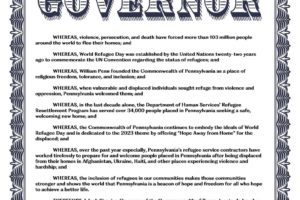Original article: GoErie.com. Anna Tischenko is a case manager at the Multicultural Health Evaluation Delivery System.

Growing up in Kyrgyzstan, I never imagined leaving my home. Then I fell in love with a Baptist Christian, and he showed me a different side of my country. As a religious minority, he faced religious persecution and severe economic discrimination. His father was routinely denied promotions and my husband, who worked construction sites for cash, was often shortchanged or simply not paid. We knew if we stayed, our children would have no future.
When we resettled as refugees here in Erie, our world changed. We immediately found jobs and community support from neighbors eager to see us succeed. Employers saw our desire to work as an asset, not as something to exploit. Erie celebrated World Refugee Day on June 20. That is why I’m writing to express my gratitude — and my hope that our country continues to embrace newcomers like us. Refugees have been vital to Erie’s economic health, combatting labor shortages, population stagnation and brain drain — obstacles we must overcome during our post-pandemic recovery.
Since arriving in the U.S., I’ve worked in various roles helping refugee families become self-sufficient. As a case manager at Multicultural Health Evaluation Delivery System, I’m often one of the first people newcomers meet. I’ve taught them how to navigate public transportation, buy food at the grocery store, make doctor appointments, register for school or day care and fill out the mountains of paperwork that come with starting a new life from scratch. Early on, they are overwhelmed, but they acclimate quickly. Refugees are unique for their perseverance and motivation to make the most of every opportunity. It’s what employers love about them: They are among the most reliable workers and lower company turnover rates. Within a few years, most refugees have established successful lives, complete with houses, jobs and children who eventually attend college.
Refugees have also played a vital role in helping us through the pandemic. More than 21% of refugee health care workers are personal care aides and more than 14% are registered nurses — both fields facing a severe worker shortages. Roughly 170,000 of them keep our food supply chain functioning. And they start businesses at higher rates than any other group, including immigrants and native-born Americans. Here in Pennsylvania, refugees pay $586.3 million in taxes and hold $1.6 billion in spending power, according to New American Economy. It’s abundantly clear that refugees are helping to lift America out of the recession, just as they did after 2008. We should be doing everything possible to welcome them and support their transition.
When I look at my own refugee family, I see three generations living happily in America. The adults are all employed U.S. citizens, raising families and giving back to the community. My husband’s family is especially grateful to have escaped religious persecution; they cherish the freedom they enjoy every day in America.
I’m relieved that President Joe Biden has begun to restore our refugee resettlement program. And I’m thankful to see America returning to its humanitarian role. We have so much to offer displaced and vulnerable families. But take it from me: They have much to give in return. If provided the opportunity, they will help revitalize communities like our own.






